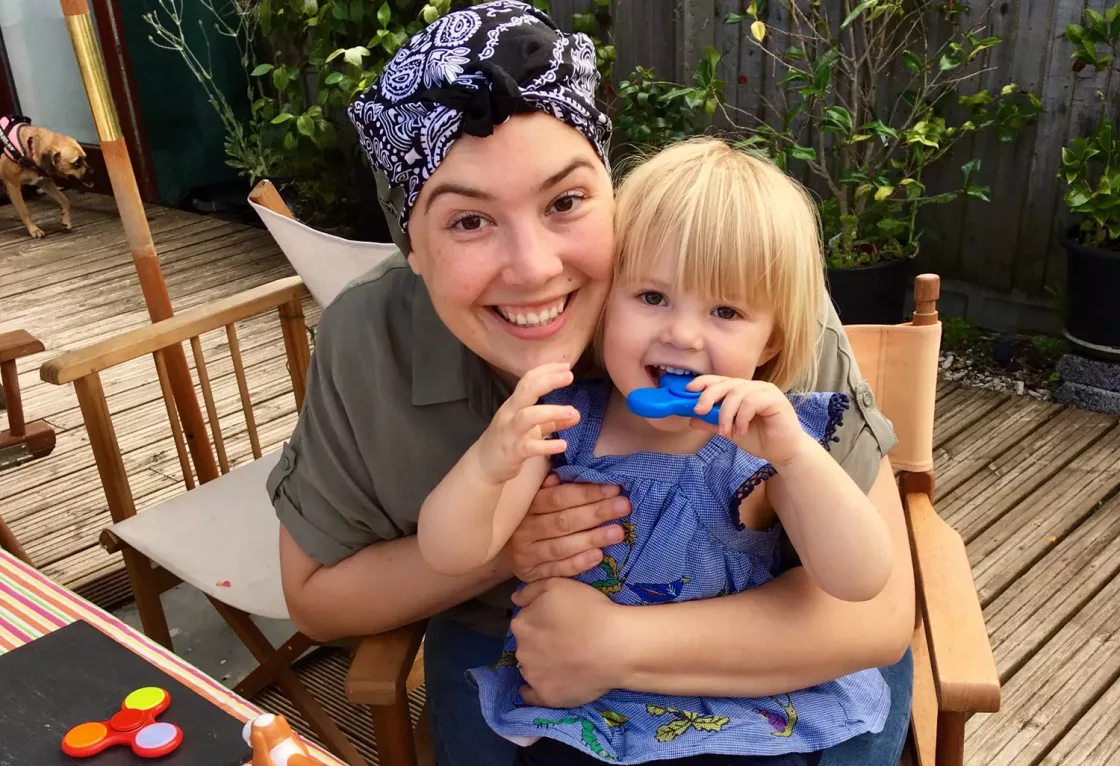
Rhiannon had already been through treatment for thyroid cancer when she was diagnosed with breast cancer. 3 years post-treatment, Rhiannon was diagnosed a second time, with a different type of breast cancer. We had a chat to her about her experience, her relationship with her chest, and why she became part of CoppaFeel!’s Education Advisory Group.
I thought that I already “had cancer” and wasn’t expecting a breast cancer diagnosis. My daughter had just turned 2 when I found a lump in my breast. I had assumed it was down to a blocked milk duct as I had recently stopped breastfeeding a few months earlier. Little did I know I had an aggressive form of hormone responsive breast cancer and a tumour had grown.”
Hi Rhiannon! Could you tell us a bit about your breast cancer diagnosis?
I was diagnosed with thyroid cancer at 24 (a thyroid is a small gland in the neck) – I found the treatment and experience all very hard but managed to push past it. Because of this diagnosis, I was told my fertility had been affected and so I went through IVF – I had always wanted to be a mother. The IVF was successful and I fell pregnant with our first daughter. Pregnancy was a very happy time for me, I breastfed her and did everything I could.
I had never really thought about breast cancer. My Grandma and her sister both had inflammatory breast cancer and my great aunt unfortunately passed away because of it, but this was the only experience I’d had and it hadn’t occurred to me as something that could affect me before my doctor mentioned that breastfeeding my daughter could lower my risk of breast cancer.
My daughter had just turned two and I thought ‘that’s enough, she’s old enough’ and stopped breastfeeding. It was shortly after that I noticed something unusual as I was lying on the sofa, having a cup of tea and a break (much needed after running around after a two year old). I had size 36GG boobs and felt a lump as I brushed past my boob. It was quite a big lump, so I thought I should get it checked out even though my first thought was that it was a blocked milk duct.
I called my doctor then and there on the sofa. I wasn’t scared to call, mainly I think because I didn’t consider that it could be breast cancer.
My GP surgery were amazing and got me in the next day to be checked. I was referred to a breast clinic and was seen within two weeks. I was still convinced it was something to do with a blocked milk duct and wasn’t worried at all. At my examination at the breast clinic, I was sent for a biopsy (a breast examination) then and there and was sat down by the doctor. They confirmed that they thought it was definitely breast cancer, but they weren’t sure what type just yet.
My husband had come with me for the appointment and this news hit him quite hard. He was with me throughout my thyroid cancer and I think it brought back lots of horrible memories for him. I, on the other hand, went into a very practical mode asking what the first thing we were going to do, i.e. when do I need to get childcare in place and what do I need to tell work. You could say that my husband had a more normal reaction and I had the weird one.
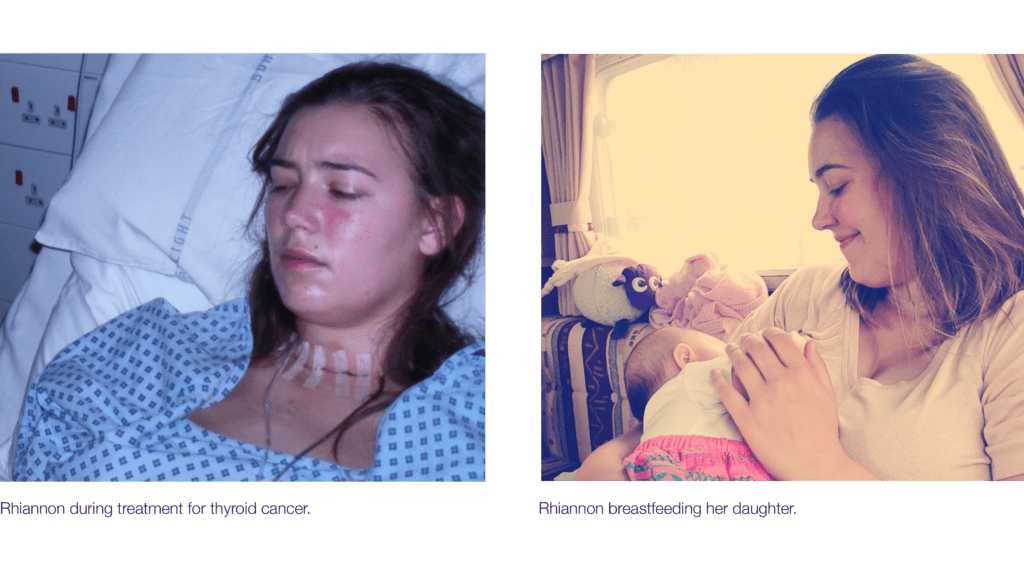
Did you find that anything helped during that time?
I had to wait a couple of weeks for the biopsy to come back with a definitive diagnosis that would determine my treatment plan. Throughout those weeks, I had a lot of worries and had to keep focusing on the next steps and positive things to keep myself occupied. I was told that I had an aggressive form of hormone responsive breast cancer and a tumour had grown. My treatment would involve chemotherapy, a lumpectomy, radiotherapy and a year of Herceptin treatment.
I found chemotherapy very difficult, especially with a young child at home. It’s not easy to deal with but it is the most effective. Radiotherapy for some is easier, but I found it exhausting – my boobs got burnt to a crisp! I found it harder than chemo in many ways and in order to get through, I created a few incentives and positive rituals. For example, I used to buy myself a new lipstick every time I had a treatment and brought in treats for the radiotherapy team. I started an instagram account @thebigcandme which meant I discovered a whole online community of other breast cancer patients who offered advice on what to do when the radiotherapy burnt my nipples etc.
It was around this time that I started looking for cancer charities as I kept thinking, I wish I’d known to check and had known more about breast cancer. I had never been taught how to do a self check and had never been told to check my boobs!
My first journey took one year to stop active treatment. After that, I recovered and went back to work as a primary school teacher. I’m quite good at moving on from things and very luckily didn’t suffer from depression.
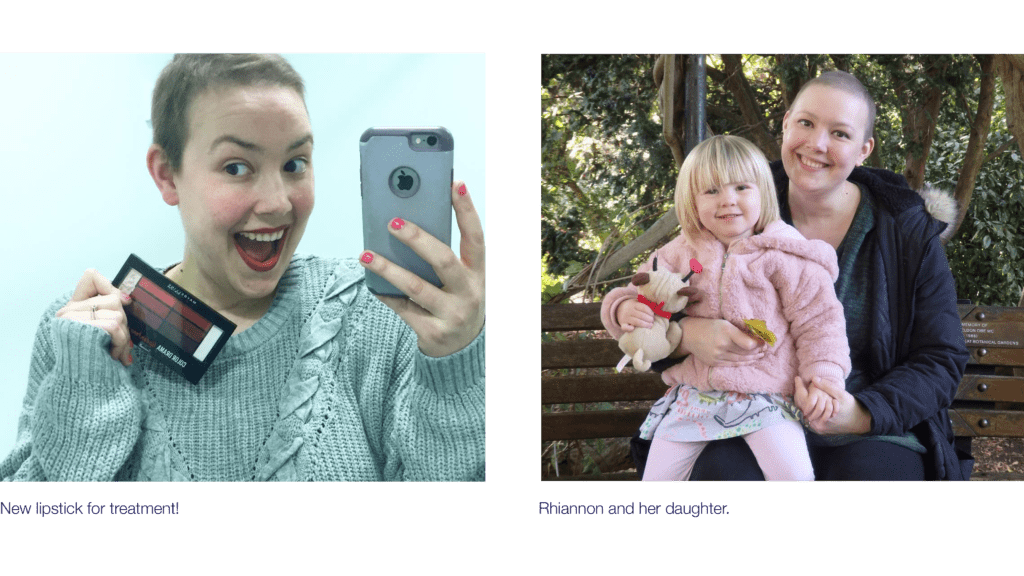
Could you explain how your second diagnosis came about?
There comes a point for most cancer patients when you stop thinking about cancer and for me, this was around the 3 years post treatment for my breast cancer. My husband and I were beginning to look into options for surrogacy, keen to have another child. And then the pandemic hit.
All of my usual follow up/check up appointments had been cancelled due to covid. In July of 2020, I thought about my mammogram and that I didn’t want to miss mine (I have had one every year since my diagnosis). I made a fuss and managed to get an appointment. About a month later, I got a letter to say that I needed to come back for a biopsy as mammogram came back with abnormalities.
When I came in for the biopsy, I began to panic a little as they took about 9 biopsies which I knew wasn’t good news. A week later I had an appointment with the consultant – whom I knew from my previous treatment, but who I knew was only called in when it was bad news. I heard those words AGAIN “it’s cancer” – this time it is another type of breast cancer altogether (Er-HER2+).
Did the pandemic make your recent experience different from your first diagnosis?
This time the whole experience was different, I had to be on my own because of the pandemic. In a way, this was good for me as I automatically went into a practical mode and made a plan with my doctor. This time, I was more confident in saying what I wanted to happen – in particular, I wanted a double mastectomy (removal of the breast).
The rest went pretty quickly from there on as I was more aware of what needed to happen. The worst thing about this second diagnosis was having to tell my husband and mum. My first breast cancer was such a traumatic experience for my family with my young daughter. The horrors of the first diagnosis were coming back to haunt me a bit, I was wondering how they were going to react. Luckily, they were incredibly supportive and it feels like a well-oiled machine this time around with everyone knowing their ‘role’ and how they can help. It probably has helped that I can’t have anyone with me at chemo as it’s simplified the process. It’s been easier and not so traumatic despite this all happening throughout a pandemic. My daughter is now 5 and as my husband is a key worker she can go to school which gives me time to recover after sessions, compared to last time when she was still so young. Shielding has been a new concept and something new to navigate. It means I can’t really do anything to be helpful or go anywhere, but my family and support network have been wonderful. It’s almost like I’m the project manager of my cancer!
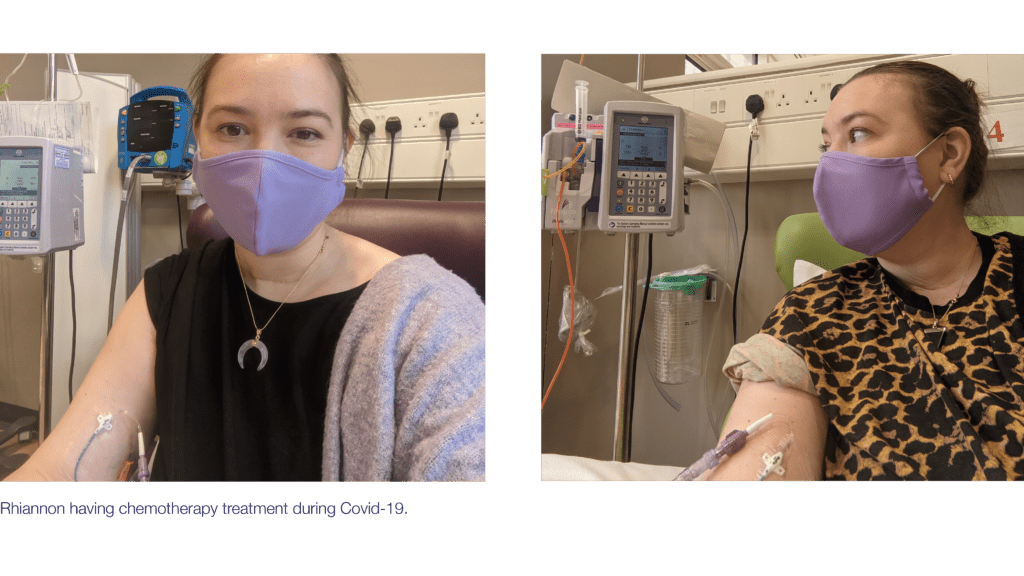
People around you like to know how they can help or have a little role they can fulfil so I’ve been better at asking for help.
I’d never ask for help before as I didn’t want to bother anyone, but cancer has taught me to accept help gracefully. It’s not a sign of weakness and it’s ok to need help.
I’ve also learnt to accept that life doesn’t always work out the way you think and sometimes you need to park the things you want to do. Before my second diagnosis, my husband and I were looking into surrogacy as I found out I couldn’t have children after my first diagnosis, which was very upsetting – even more so than being diagnosed with cancer. I was more upset each time that I was being stopped having more children and this has made me more accepting that it wasn’t just supposed to happen now. Acceptance is one of the hardest lessons in the cancer world.
There are so many positive things that I feel I have gained from my cancer diagnoses. I have felt like I’ve shined the brightest in my darkest times and that’s thanks to cancer. I have done lots of public speaking through Macmillian which I wouldn’t have done before. As much as cancer has a myriad of negative things, it’s brought me life and happiness as well – my daughter, my charity work, my cancer communities online – none of which I would have otherwise. Of course, people who go through cancer all have different perspectives. My opinions and views might be different to those who’re having their first diagnosis or a prognosis different to mine.
I have had three cancers and three opportunities to live, so I feel incredibly lucky that I am still alive. In my experience, cancer has made me a lot more grateful and happy in life. I don’t sweat the small stuff.
What was your relationship with your chest like before your diagnosis? Did you check your boobs?
Having thyroid cancer made me more aware of my physical body – specifically hormonal changes and how I felt physically, but although I was more aware of my body, I wasn’t checking for lumps and bumps, other than on my neck as I was never told there was a link between thyroid cancer and breast cancer and I was never told to check my boobs, or be aware of other signs and symptoms. I didn’t check my boobs – I was a young person who was wanting to enjoy myself and really push cancer out of my brain and not let it be who I am.
After my thyroid cancer I was so grateful for my body! I didn’t care about my weight, my hair, my looks, I was just so grateful for it. I have such a great relationship with my physical body. To me, my physical body is my vessel so I look after it however I can and be aware of it. I respect my body.
I found I became more aware of my boobs when I was pregnant and breastfeeding. I was more aware of the changes that were happening and how my boobs were feeling.
I have never touched my boobs more than when I was breastfeeding! It struck me as strange that no one was telling me on regular check-ups how to check or what might be normal changes and what might be unusual. At no point during my pregnancy was I spoken to about breast cancer.
During IVF, pregnancy and having my daughter – the relationship between your body and mind changes – realising how miraculous your body is. My body is incredible for bouncing back after all this. Every part of my body is scarred up, it doesn’t look like a model’s body but it’s mine and I love it. I’m proud of it and I hope I can continue to look after it for the rest of time.
I believe it’s important for us as adults to make sure that young people hear messages like this: Accept who you are, respect who you are and be nice to your body. When I had my double mastectomy, it was a weight off my shoulders (quite literally) because I realised that my body could function without my boobs and was just so proud of it for bouncing back once again.
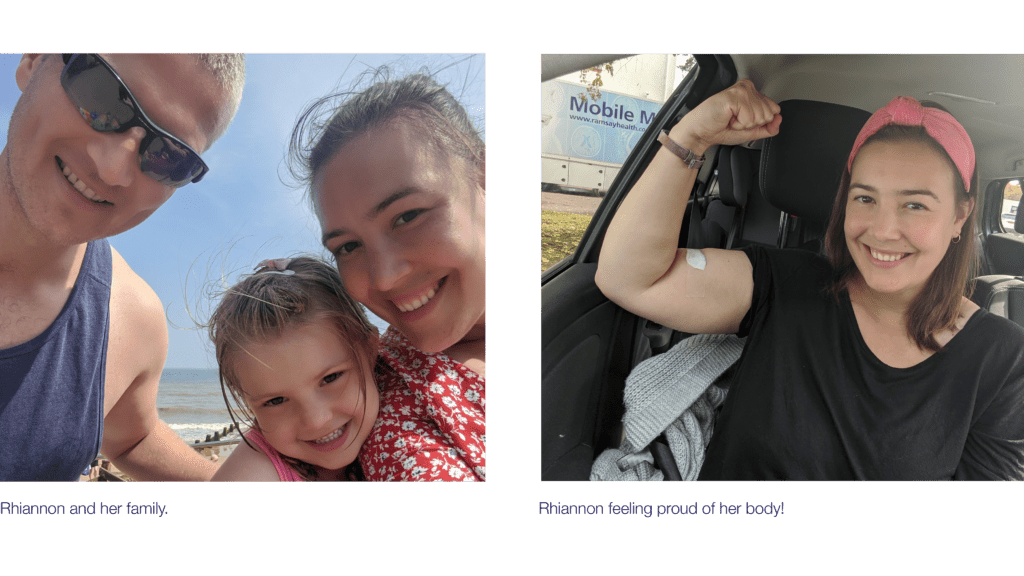
How did you get involved in CoppaFeel!’s Education Advisory Group?
CoppaFeel!l has played a vital part in my recovery and my own body awareness. I am lucky enough to be part of Team Boobs as part of their EAG (Education Advisory Group) and know how hard they all work to get their message and mission out there.
I applied to be on the EAG because I wanted to help in any way I could to raise awareness amongst young people and as well as bringing my experience as an educator, I thought my personal diagnosis might be helpful. I have a passion for educating and also for helping charities extend their expertise and awareness raising to help prevent people from getting diagnosed late.
When I was younger I thought cancer was an older person’s disease as no one was putting it out there that I could be affected. As a young female, I was never taught about breast cancer or body awareness at school and I want to help change that with the work that CoppaFeel! do. My second breast cancer wasn’t a lump at all and more people should be aware that breast cancer can present itself in many different ways.
People take notice when it’s in an educational setting, when it’s in school it comes with authority. I’m interested in exploring how we can develop ways to connect with young people to communicate and infiltrate at their level to raise awareness that breast cancer is something that can affect you whatever you age!
If you’d like to find out more about CoppaFeel!’s Education Advisory Group, click below to find out about our work in schools.